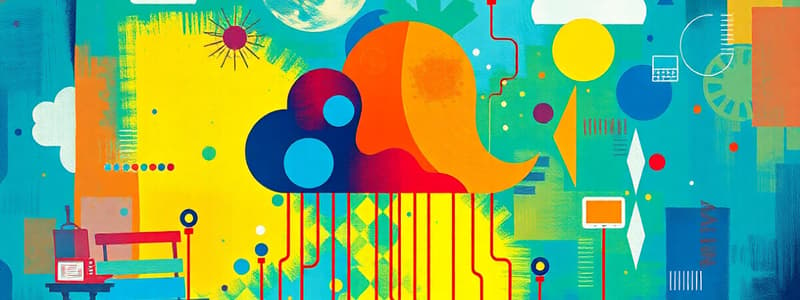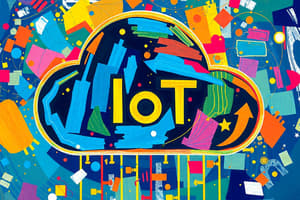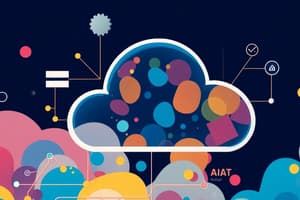Podcast
Questions and Answers
What is a defining characteristic of cloud computing?
What is a defining characteristic of cloud computing?
- It relies exclusively on local servers.
- It is only accessible through private networks.
- It delivers computing services over the Internet. (correct)
- It requires significant physical infrastructure.
Which type of cloud offers dedicated infrastructure for a single organization?
Which type of cloud offers dedicated infrastructure for a single organization?
- Public Cloud
- Private Cloud (correct)
- Community Cloud
- Hybrid Cloud
What is one of the primary benefits of using cloud computing for Management Information Systems?
What is one of the primary benefits of using cloud computing for Management Information Systems?
- Allows scaling resources based on demand. (correct)
- Limits remote access to data and applications.
- Enhances dependency on in-house IT staff.
- Increases the need for physical hardware investments.
What does server virtualization enable?
What does server virtualization enable?
How does mobile computing primarily benefit Management Information Systems?
How does mobile computing primarily benefit Management Information Systems?
Which of the following best describes hybrid cloud computing?
Which of the following best describes hybrid cloud computing?
What role does virtualization play in backup and recovery?
What role does virtualization play in backup and recovery?
What capabilities do mobile applications provide to businesses?
What capabilities do mobile applications provide to businesses?
Flashcards
Cloud Computing
Cloud Computing
Delivery of computing services (servers, storage, etc.) over the internet.
Public Cloud
Public Cloud
Cloud services available to the general public.
Private Cloud
Private Cloud
Dedicated cloud infrastructure for a single organization.
Hybrid Cloud
Hybrid Cloud
Signup and view all the flashcards
Mobile Computing
Mobile Computing
Signup and view all the flashcards
Virtualization
Virtualization
Signup and view all the flashcards
Server Virtualization
Server Virtualization
Signup and view all the flashcards
Mobile Applications in Business
Mobile Applications in Business
Signup and view all the flashcards
Study Notes
Lesson 4: MIS
- Lesson 4 focuses on emerging technologies in Management Information Systems (MIS).
- The objective is to explore cloud computing, mobile computing, Internet of Things (IoT), and their impact on MIS.
- Emerging technologies include new tools, platforms, methodologies that can disrupt traditional business and improve efficiencies in operations.
- These technologies are reshaping how organizations manage information, improve decision making, and engage with customers.
- Cloud computing delivers computing services (servers, storage, databases, networking, software, analytics) over the internet ("the cloud").
- Types of cloud computing include public cloud (services via public internet), private cloud (dedicated infrastructure for one organization, offering more security and control), and hybrid cloud (combining public and private, enabling shared data and applications).
- Benefits of cloud computing include easily scaling resources, reducing infrastructure and maintenance costs, and facilitating remote access and collaboration.
Virtualization
- Virtualization creates virtual versions of physical hardware, enabling multiple operating systems and applications on a single physical server.
- Types of virtualization include server virtualization (partitioning physical servers into multiple virtual servers), and desktop virtualization (hosting desktop environments on a central server).
- Benefits of virtualization include simplified backup and recovery, ensuring business continuity, and allowing isolated environments for testing applications without impacting the production system.
Mobile Computing
- Mobile computing uses portable devices (smartphones, tablets) to access and process data anywhere, anytime.
- Applications include mobile apps for business processes (CRM, project management), mobile-friendly websites, and e-commerce platforms.
- Benefits for MIS include enabling employees accessing information, improving decision-making, enabling businesses to reach customers with improved service delivery, and enabling real-time data collection from customers to enhance market analysis.
Internet of Things (IoT)
- IoT refers to interconnected network of physical devices embedded with sensors, software, and technologies to collect & exchange data over the internet.
- Applications include smart homes (smart thermostats, security systems) and industrial IoT (sensors on machinery for predictive maintenance).
- Benefits for MIS include generating data for actionable insights & better decision-making, automating processes for reduced costs and increased efficiency, and enabling real-time data for personalized services & products based on customer preferences.
- Emerging technologies including cloud computing, virtualization, mobile computing, and IoT are transforming the landscape of Management Information Systems.
- Organizations need to be proactive in adopting these technologies to remain competitive while addressing security and integration challenges.
Studying That Suits You
Use AI to generate personalized quizzes and flashcards to suit your learning preferences.




